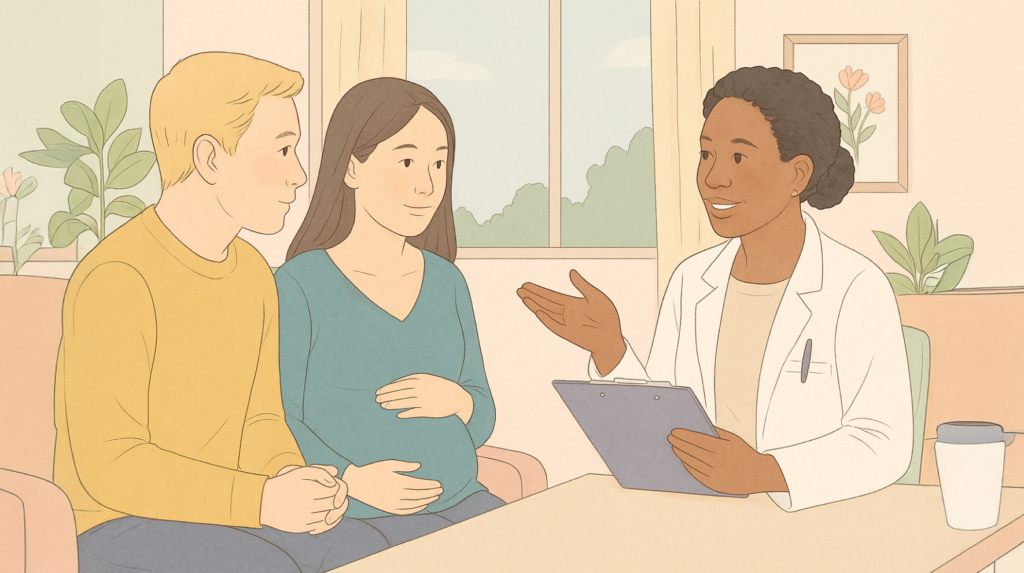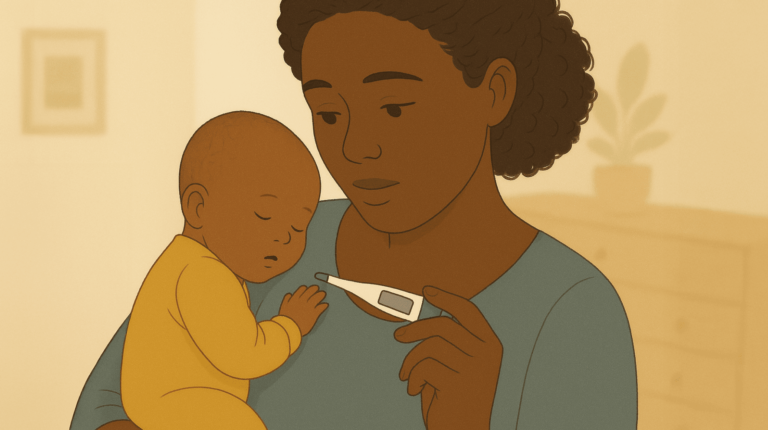June is World Infertility Awareness Month, a time to raise awareness about the medical, emotional, and societal challenges faced by people trying to conceive. Despite affecting nearly one in 6 couples globally, infertility remains one of the most misunderstood areas of reproductive health, often surrounded by outdated myths, silent struggles, and stigma.
At Cradlewise, we believe that knowledge is one of the most powerful tools on the path to parenthood. That’s why we’re breaking down the science behind infertility, clearing up common misconceptions, and sharing real, evidence-based solutions.
To help us understand the complexities of fertility, we spoke with Dr. Lawrence B. Werlin, MD, FACOG, of HRC Fertility Newport Beach.
Dr. Werlin is a nationally recognized expert in Reproductive Endocrinology and Infertility. Practicing since 1982, Dr. Werlin is the founder and Medical Director of Coastal Fertility Medical Center in Irvine, California, and has been honored as one of America’s Top Obstetricians and Gynecologists for two decades. He was also the principal investigator of three major studies on preimplantation genetic diagnosis (PGD) that helped shape the future of reproductive medicine.
What is infertility, medically speaking?
Infertility is defined as the inability to conceive after 12 months of regular, unprotected sexual intercourse. For individuals over 35, this timeframe is reduced to six months, as fertility naturally declines with age. This definition is recognized by the World Health Organization (WHO) and the American College of Obstetricians and Gynecologists (ACOG).
There are two main types of infertility:
- Primary infertility: When a person has never achieved a pregnancy.
- Secondary infertility: When a person is unable to conceive again after previously carrying a pregnancy to term.
Infertility can be caused by a range of factors, biological, hormonal, environmental, or lifestyle-related, and it affects all genders.
How common is it, really?
Infertility is more prevalent than many people realize. Globally, about 1 in 6 couples will experience infertility during their reproductive years, according to a 2023 report by the WHO. In the United States, roughly 19% of heterosexual women aged 15–49 with no prior births are unable to get pregnant after one year of trying, as per data from the CDC’s National Survey of Family Growth.
Importantly, infertility is not just a “women’s issue.” Male factors contribute to approximately 40–50% of all infertility cases, often involving low sperm count, poor motility, or hormonal imbalances. In about 10–20% of cases, the cause remains unexplained even after thorough medical evaluation.
Our conversation with Dr. Werlin
Cradlewise: When should couples seek medical help for infertility?
Dr. Werlin: The most critical factor that plays a role is the age of the egg. You’re born with all your eggs, so a woman who is 25 years old has 25-year-old eggs. A woman who is 30 years old has 30-year-old eggs.
“ Typically, if you’ve been trying actively for a year or more and are under the age of 35, you should absolutely seek care with a reproductive endocrinology and fertility specialist. If you are older than 35 and have unsuccessfully achieved a pregnancy in six months of trying, you should without a doubt see an infertility specialist.”
If you are 38 and older, I would give yourself a maximum of three to four months and if you’re unsuccessful, no question, you should see a specialist.
Cradlewise: Can sleep quality affect fertility in both men and women?
Dr. Werlin: Absolutely—sleep plays a crucial role in overall health, even in day-to-day life. When people don’t get adequate rest, it can disrupt their entire physiology, which in turn can impact both egg and sperm development.
Sleep is an important factor and typically adults should have at least between 6-8 hours of restful sleep where you get to sleep fairly consistently for that period of time.
Cradlewise: Does long-term use of birth control impact fertility?
Dr. Werlin: Studies have been done looking at the use of oral contraceptives in the various etiologies and causes of infertility.
When you compare the different causes of infertility with people who’ve not been on the pill versus people who have been on the pill, there doesn’t seem to be any significant difference in the various causalities. So I would say, probably not.
Cradlewise: Is IVF the only option for couples facing infertility?
Dr. Werlin: Statistically speaking, IVF is the best option for treating infertility because you get the eggs, you get the sperm, you put them together. You see fertilization occur and you ultimately put the embryo back in the right spot. The only unknown is whether or not it will implant.
Whereas with IUI or intrauterine insemination, you never know that the egg gets picked up by the tube. You never know the sperm and the egg meet in the tube. You never know that fertilization occurs.
Then even if all those things occur, you never know that it will implant. Although IUI is better than timing with intercourse because you at least put the sperm in the correct spot, the likelihood for success in anyone cycle for IUI is about 8 to 10%. So statistically speaking, IVF will always be the best option.
Cradlewise: How does male fertility contribute to conception challenges?
Dr. Werlin: Regardless of what is found, infertility is a couple’s issue. It’s rarely just one factor that predisposes someone to fertility challenges, unless there’s a complete absence of sperm, eggs, tubes, uterus or ovaries.
In most cases, it’s a combination of contributing factors. But there’s absolutely no question that male factor infertility can be a significant issue. When we conduct a semen analysis, we typically evaluate four key parameters: the count (the number of sperm), motility (the forward progressive movement), morphology (the shape and structure) and the presence or absence of white blood cells, which can indicate infection.
“ Low sperm count, poor motility, abnormal morphology or infection can all inhibit the sperm’s ability to penetrate the egg—so yes, male factor can clearly impact fertility. Fortunately, there are ways to address this. A reproductive urologist can perform a more detailed evaluation, including hormone testing and an ultrasound to look for conditions like varicoceles (varicose veins in the testicles).”
Depending on the findings, treatments may include medication, lifestyle modifications or even surgical sperm retrieval procedures to obtain the best possible sample.
Cradlewise: Do stress, diet, and lifestyle significantly impact fertility?
Dr. Werlin: The easy answer to the question is yes. Stress triggers certain hormones that can disrupt ovulatory function and also affect sperm production and quality, so it can impact both partners.
There’s also no question that poor dietary habits can play a role. Extreme dieting, fasting or consuming a diet high in processed foods can negatively affect both egg and sperm quality.
Lifestyle factors matter as well. Regular exercise, at least four days a week for about an hour, can help improve blood flow, support overall health and enhance oxygenation of reproductive tissues, including the ovaries and testicles. So yes, stress, diet and lifestyle all play a significant role in reproductive health.
Cradlewise: Is it harder to conceive after age 35 and what does that mean for modern parents?
Dr. Werlin: Women are born with all the eggs they will ever have, so at 35 years old, you have 35-year-old eggs; at 40, you have 40-year-old eggs. As eggs age, the genetic material within them begins to break down, making them less viable, less functional and less likely to result in a successful pregnancy.
“ For individuals who are younger but not yet ready to start a family, fertility preservation options like egg freezing can be a proactive step. Those with partners who also aren’t quite ready may consider freezing embryos instead. As you age, achieving a successful pregnancy becomes significantly more difficult.”
Cradlewise: Can environmental factors or household products affect fertility?
Dr. Werlin: Yes, they can. Environmental factors absolutely have the potential to affect both sperm and egg quality. Oxidation, which occurs naturally throughout the environment, can damage reproductive cells.
“ That’s why we often encourage patients to take antioxidants such as CoQ10, vitamin B complex, zinc and antioxidant-rich foods like dark berries (blueberries, blackberries, acai) to help combat oxidative stress. In addition to oxidation, environmental pollutants may also negatively impact fertility.”
Certain household products and cleaning agents can contain harmful chemicals that affect sperm and egg quality. It’s important to take precautions when using these substances, such as wearing gloves and even a mask, to avoid skin contact and inhalation of potentially harmful agents.
Protecting your skin and respiratory system can be a small but meaningful step in safeguarding reproductive health.
Conclusion
Infertility is complex, but knowledge is power. Whether you’re just starting to think about growing your family or are deep in the TTC journey, understanding the science behind fertility can help you advocate for your body, seek timely care, and protect your emotional well-being. At Cradlewise, we’re here to support you through every step, with evidence-based insights, compassionate tools, and smarter sleep for your future little one.


